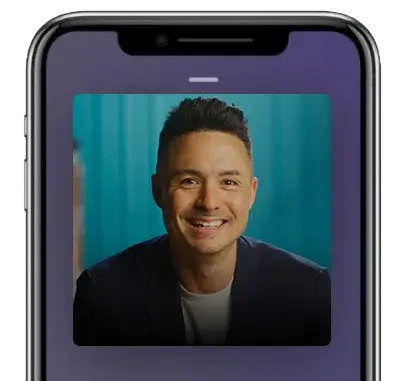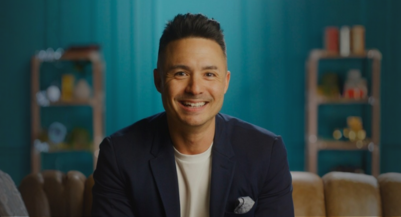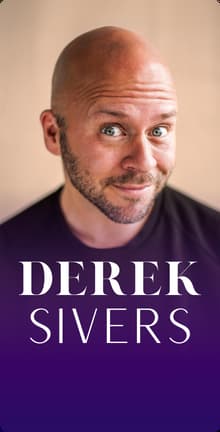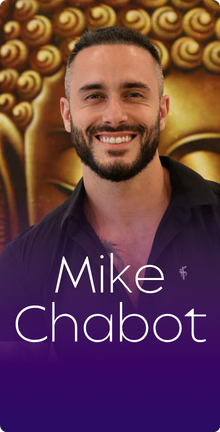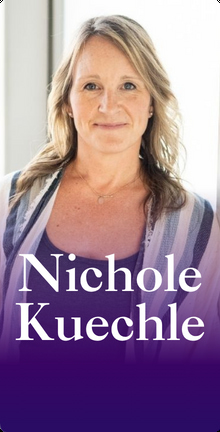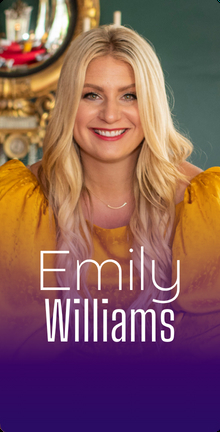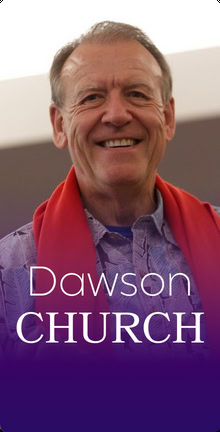In this Episode
- [03:05]Nicholas Kusmich opens up about the financial struggles of running a church and how that eventually led him to take what turned into a 14-year break from ministry.
- [09:58]Nic talks about walking away from the marketing world to dedicate himself to guiding psychedelic experiences and exploring the spiritual and scientific insights behind them.
- [15:00]Stephan reflects on how a life-changing quote from a monk shifted his perspective.
- [18:09]Nic breaks down how we create endless checklists of things we think will make us happy, when in reality, happiness is already found in the experience itself.
- [26:20]Nic encourages letting go of attachments and meeting life with openness, reminding us that real joy comes from how we show up, not what we hold onto.
- [29:06]Nic reveals the working title of his documentary, Unbecoming, and shares how it’s about peeling back layers rather than constantly adding more.
- [38:58]Nic reflects on experiences with 5-MeO-DMT as profoundly intense—sometimes dissolving thoughts, beliefs, and a sense of self into what feels like pure awareness.
- [48:10]Nic makes it clear that 5-MeO-DMT isn’t meant to be a crutch, but a tool that can speed up the journey of personal transformation.
Nic, it’s so great to have you on the show.
I’m super stoked. It’s been a while, and I know that something has happened in both of our lives since we last spoke. I’m just excited to have this conversation because I know every time we connect, we chat about some good stuff. I’m excited.
Yes, for sure, and you were one of my early guests on Marketing Speak back in 2015 or so. Here we are on another episode, but with a completely different topic and a big pivot for you, actually, because you are in a new phase of your life. I’d love for you to maybe start by sharing the origin story, that superhero origin story of how you got here, but then, where are you taking this, and what are you leaving behind?
What a great question. The origin story, if we go all the way back, and I don’t want to, before I was born, now we’re not going to go that far. But I was thrust into, quote unquote, entrepreneurship by accident. What I mean by that is, I’m an only child, my parents were immigrants, and they had a very difficult time making ends meet. My father had some health complications, and it forced me to kind of figure stuff out and say, “How do I take care of my family?” I had to make that decision around the age of 15 or 16. I made that decision. I got thrust into entrepreneurship. All the while, however, there was another side of my life that suggested I also wanted to make an impact. When I was juggling the two, the side that said I wanted to make an impact clashed with my worldview, which suggested, “Well, you’ve got to go into ministry,” because that’s all I knew at the time.
At the age of 17, I became a youth pastor. At the age of 19, I became ordained and started my own church. The reason entrepreneurship was kind of in the mix of everything as well was because the church wasn’t paying the bills, and I decided not to take a salary from the church. I had to figure out how to make ends meet so I could pursue this passion project.
Divine consciousness is the ground of every experience. You’ve just forgotten it’s there. Share on XConcurrently, I was pastoring a church and figuring out the entrepreneurship game. I did that for about 14 years before I said, “You know what, I need to take a step back from this ministry stuff.” I thought it would be a year-long sabbatical, but it ended up being 14 years, taking a break. But through that, as an entrepreneur, there was a part of me that was always saying, “Is there more to life?” What are the deeper questions that we always ask?
“Is there a God, if we want to call it that? What is the meaning of life? What is the purpose? How do we be fulfilled?” Because there was this recurring pattern that I noticed in my life, I thought that fulfillment came from the pursuit and the achievement of milestones. I got into entrepreneurship, and I’m like, “All right, well, I’m making money now. What if I just buy that next car, or buy the house I’ve always wanted or buy the thing that I always wanted to do?” My life felt like this natural, undivided pursuit of happiness.
Happiness could be reworded as love, peace, contentment, or whatever you want to call it. But it was like pursuing these things. The means of entrepreneurship like provided a means for me to acquire stuff and to draw lines in the sand and say, “If I could just be this person, if I can marry this person, if I can own this stuff, if I could say this, if I got a million followers on social,” like so on and so forth, all these little things out there.
In the midst of all that, in 2018, in one of my mastermind circles, people started to talk about this idea of therapeutic psychedelics. Honestly, that just scared the shit out of me because I was a pastor and drugs are bad and I bought into that whole like narrative and so I like, “No, no I don’t want to do this.” We let some time pass. A year passed, and then in 2019, the opportunity presented itself for me to visit with a clinician with my wife and do a therapeutic clinical experience with a psychedelic. At the time, I didn’t even know what that meant. But I just went in with an open heart and an open mind and said, “Let’s see where this takes me.”

Wait a second, how did you go from I’m against this and it’s against my values a year ago to one year later, you’re like, “Okay, here I am, I’m signed up.”
It sounds like a very quick process, but every step of that year, I was talking to other people who’ve done it. It was questioning my own beliefs internally, like, “Why do I hold these beliefs? Why do I think it’s bad? What’s true about it? What’s not true about it?” Going through this process of saying, “Well, worst case scenario, I discovered some things about myself that I don’t like, and we’ll have to sort that out. Best case scenario, I’m opened up to a world that might provide me one step closer to some of these answers I’ve been seeking my whole life.”
I reevaluated the pros and cons over the course of a year, consulting with numerous people, conducting thorough research, and ensuring that the individuals I was working with were as well-governed as possible, encompassing the entire process. I wasn’t in some dude’s basement somewhere. I made sure it was in a clinical setting with registered people, and all those things were just enough to check some boxes in the back of my head to say, “This is okay.”
When your wife was driving this, or was it you driving?
No, this was a great question. It was me, and I was like, “Okay, babe, we’re going to do this thing.” She goes, “What is it?” I’m like, “I don’t really know fully, but we’re going to ingest a pill. It’s going to be like the limitless pill. It’s going to just open us up to all these things.” She’s like, “What does that mean?” I’m like, “Babe, just trust me, let’s go for this.”
You saw that movie, right? That’s not a lot of fun for the Limitless guy, right?
Honestly, that’s not far from the exact truth of how I pitched it to her. God bless her. She just trusted me and said, “Look, you’ve never let me down before. Let’s go for it. You can hear her version of the story one day.” It’s hilarious because, apparently, a few minutes into the experience, she’s shouting on the top of her lungs, “Nick, why did you do this to me? What is happening here? I didn’t sign up for this.”
On the flip side of it, it ended up being a beautiful experience for both of us. But what happened after that experience was that my mind was opened up to understandings and realities that I didn’t know existed. Now, it doesn’t mean it answered all my questions. In fact, it gave me more questions than answers, but that was enough to spark something in me to say, “What is going on here, and how does this correlate to this deep-embedded inner knock that I have in my life that says search for the deeper meanings?” My personality generally is to dive in two feet into something once I’ve discovered it. That was the beginning of another year-long journey of us saying, “Okay, well, what is this world? What are these molecules and substances? What do they mean? How do they correlate to bigger spiritual teachings and understandings and all this?” I’ll fast-forward a little bit.
In 2019, I don’t remember the exact date, but somewhere around that time, a year later, I had an experience with a particular molecule. I know this sounds clickbait-ish, and it’s meant to be a little clickbait-ish, but it’s also my truth. I’d been a pastor for 14 years, trying to understand God. I had an experience with a molecule that, in less than 10 minutes, gave me that experience. My life, on the one hand and my perspective were completely and utterly shattered.
Suffering begins the moment we believe we’re separate from each other, from source, from ourselves. Share on XIt sent me on this like, “Okay, there are things I don’t understand.” Through that one molecule in that experience, my mind went to the place where I realized I’m not the only person or the first person to have ever experienced something like this. It put me on a massive research path to say, “Who in the last billion years of this earth’s existence and millions of years of humans existing can explain what I am, what experience I had?” The short of it is that we started to realize there were ancient traditions that have been in place for thousands of years.
Who has given some sort of name, label, and understanding to the experience I had? I started taking those understandings and combining them with a bit of neuroscience to come up with my own words to explain it all. But what that did was, invariably, and getting to the answer to the question, shifted everything I knew to be true about life. For 14 years, in fact, 25 years, my identity had been wrapped up as a marketer. I was an online marketer. That’s what I did. It’s what everyone in the world knew me for. That’s how we met, right? Part of this experience started to question that identity and say, “Who are you really? Is that just a costume you put on and an avatar that you display? What would happen if you decided that that wasn’t the hat you wanted to continue to wear?”
That’s how I knew you.
One thing led to another. My wife and I started working in this space. We started facilitating experiences with this molecule. I started deep diving into the neuroscience of it. Started deep diving into the spiritual elements of it. I started to bring it all together, and I had been doing so behind the scenes while marketing for the last four or five years. As of earlier this year, four weeks ago from the moment we’re having this conversation, I made an official announcement that I’ve completely retired from the marketing and digital online space, and I’m doing this now.
The premise of unconditional openness is that exactly how life unfolds in every moment is an invitation for us to say yes to whatever is happening in that moment.
We were saying just offline before we hit the record button. ‘How did that happen?’ One of our deep principles that we live by is something that we call unconditional openness. It’s based on the idea that maybe, the world, the universe, God, or whatever you want to call it —spirit —has things figured out without our participation. I didn’t have to wake up this morning and will the planet to orbit the sun in its solar system on the right axis. The universe already figured that part out. I didn’t have to wake up this morning and willfully breathe air into my lungs.
The universe figured out how to give me a body that could do that automatically. The premise of unconditional openness is that exactly how life unfolds in every moment is an invitation for us to say yes to whatever is happening in that moment. My wife and I took the position that it doesn’t mean we’ll always say ‘yes,’ but our default will be yes to whatever unfolds before us. Opportunities kind of led to one another. It said, “This is the thing that you should step into.” It’s also the reason why, after a bunch of years, you reached out and said, “Shall we chat again?” My default answer is “yes.” The universe is unfolding in a certain way, and I’m not going to get in the way of it.
That’s like living a life as if it were an improv class.
You’re a character. You get to decide what lines you want to say and how you tell them, and have fun and collect points, change the skins and have fun. But that’s a very accurate depiction. It’s an improv class, and you never know what the next second is going to unfold before you. But if you take a posture of saying, “Well, I’ll be open to it, whatever it is, even if it doesn’t align with my preferences.” It feels uncomfortable. I have a whole belief system around what preferences are and how they ruin our lives and all that. But I love the idea of an improv class and just enjoying the moment as it unfolds, just like we’re doing right now.
That’s right. I always talk about life being like a video game or a movie. You’re like Truman in The Truman Show. You’re the star. You’re the observer. But I like this model of an improv class because it opens you up to so much potential. Another way to frame it, which I also like, is the concept of the willing suspension of disbelief. Get the crotchety and set in our ways. Especially as we grow older, and if we instead take a stance of willing suspension of disbelief, then we have that openness that you were talking about.
One other thing I want to share is that this is a powerful, yet concise, statement. I learned it in India. I was on a Tony Robbins platinum partner trip, and these monks were brought in. One of the key tenets or principles that I gained from that, as well as an awakening experience, was actually having a molecule experience without having to ingest anything. I just got a blessing. I got touched on the head by one of the monks, and I had a psychedelic experience of the divine. The statement is very simple. “The divine is an experience, not a belief.”
I love that. Then there’s so much depth to that. Could we go on for hours, even just talking, talking about that? Oftentimes, you’ll hear some say, and nothing against any tradition or practice, because I think in the essence, every practice and every tradition and every faith and every spiritual anything is designed to bring people into union with the divine. But in the midst of that attempt, people then institutionalize and create separation with the divine and say, “I’m just looking for an experience with the divine because I don’t have it, and I’m separated from it.”
I have to do these 10 steps to get reconnected. One of the most misleading understandings is that it’s just a trick of the mind. But one of the most misleading understandings is that at any point we are separate from the experience with the divine. The very fact that I am looking at a camera seems like this camera has form and it’s a material object, which it does. We all would. This is just like basic quantum physics. I’m not actually looking at a camera. I’m looking at quarks that are vibrating at a certain frequency, but I’m not actually even looking at that. It’s electromagnetism that’s creating this form and light bouncing off that, that’s projecting something onto my mind.
Every practice, tradition, faith, and spiritual aspect is designed to bring people into union with the divine.
The whole point is that the foundation of every single thing that we can call an experience is divine consciousness. To ever say ‘we’re not having that experience is a misnomer.’ It’s just sometimes it could appear that way because we’ve got so caught up in our mind or our ideas or certain thoughts or beliefs that present themselves as separation, but that’s actually not even possible, even if we wanted to do it. I love that. I love how you shared the idea that the divine is not a belief, it is an experience in its purest sense.
If you think about it, what would be an experience that got you into the track of becoming a pastor, what would that have been? Was there some sort of moment where you felt like this presence or this connection or this peace or divine guidance or something that told you or made you kind of more aligned with becoming a pastor, because that’s not an easy path, and that’s not something that most people take?
That’s a great question. It was the summer between when I graduated from junior high school and went into high school. I had been invited at that time to a church retreat, where they go away for a few days. I was this young, almost high school kid. I said, “Sure, I want to hang out. Will there be some girls there? I’ll be there for sure.” It was very interesting because I was asked to help set up some of the sound equipment. I was doing that, and everybody left the room and left me for a few minutes to do that. I don’t know where they went, and it was in the midst of just being there on my own that I had what I could only describe at the time as an experience with the divine.
When I say an experience, a more visceral experience, we’re always having an experience with the divine, but this was more of a visceral, face kind of experience. I’m not sure if it was audible, but it felt that way. Or if it was just really loud in my heart, or being, or mind, or wherever the voice came from. But it was an invitation to step into a different version of the life that I was currently living. It was a life that said, ‘Would an invitation to be more aligned, an invitation to consider others, be a life of impact, if you will?’
The foundation of every experience is divine consciousness.
All the while, it didn’t feel foreign. It lit up in me the very things I felt already to be true. In my own little way, with no spectacular fireworks or no Himalayan mountaintop or nothing, I made a decision to just say, “Yes, I will step into this alignment.” That unfolded in many ways. At that time, I defined that as a conversion experience into the faith and my initial steps into the role of ministry and as a pastor. But yes, it was indeed very much.
I believe everyone, if they’re quiet enough to listen, can hear what I would define as an inner knock. Many things are defined differently, and people define them differently. But for me, if everyone’s quiet and it comes in really odd ways, I remember growing up and watching a great movie, like a Christopher Nolan movie, let’s say. The movie ends, and the credits go up.
For a moment, you’re like, ‘glued to your seat, you can’t move.’ It’s like, ‘Whoa, like, is there something? Is there something more than the life I’m experiencing?’ Sometimes it’s in holding your newborn baby for the first time, sometimes it’s at the funeral of a loved one.
Sometimes it’s nothing more than going outside and watching the sunrise or sunset. Just for a moment, there’s this something inside that I don’t know how to word it, ‘a calling, a knob, hey, pay attention.’ I think if we’re all on it. There’s something, and again, the words fall short. But if we’re all honest with ourselves, we’ve all had some sort of experience like that. Sometimes they’re louder, sometimes they’re quieter. But each time it is an invitation to say, “Are you fully aligned? Are you living the way you feel like you could be?”
Every decision that all of us make in this life that we live is in the pursuit of happiness.
I’m not saying from a dogmatic standpoint, are you following the rules that should be, but I tend to say every decision that many of us make, in fact, every decision that all of us make in this life that we live is in this pursuit of happiness. It’s, ‘I just want to be okay here and here. If I can be okay here, then life will be beautiful.’ We reverse engineer, and because of things that happened in our lives, we have these imprints, and these imprints then start saying. ‘Well, in order for me to feel happy, in order for me to feel okay, in order for me to feel peace and contentment and love, these 10 things need to happen.’
We define that. We say, “Well, I need to get married and I nearly live in the Hollywood Hills or I need to be in Malibu and I need to see sunsets all the time and the weather needs to be 30, know, 75 degrees and my kids need to listen to me and be grateful and adore me and my staff and we have this list” and say, “Just this list, if the universe can bend to my list, then I’ll be happy.” We literally reconfigure the entirety of our lives to make sure that that list is somehow fulfilled. And so, ‘I’ll meet this person. I’ll have this kind of business. I’ll pursue this kind of career. I’ll make this kind of impact.’
All with this idea that if I can get these things off the checklist, I’ll feel fulfilled, happy, loved, content, and at peace. Then one of two things happens. We get those things, and we realize, ‘I don’t feel any different than before I got those things.’ Or we get those things and say, “Huh, I need a new list. As I’ve arrived, I don’t feel particularly happy. Maybe it means it’s the next list.” I encourage anyone to think that what we’re looking for is not the things on our list. Life will be really difficult if we demand the universe bend to our will to fulfill our list, because that’s rarely going to happen. Then you’ll be miserable if that’s your requirement.
I encourage people to think that they don’t actually want the things on the list. You want the feeling you get, you think you will get if you get all those things on the list, which is the peace, love, contentment, happiness and all that stuff. If that’s the case, then reality says ‘we don’t need those things to feel that way.’ Instead, what if we just dropped the list altogether and went straight to the source, having that experience, regardless of whether the universe lined up with our will and our little checklist of happiness. ‘What would life be like then?’

That is kind of our pursuit. It’s realizing that through life, we’ve had some experiences and those experiences, if we didn’t allow them to pass through us in a certain way, create these imprints, and those imprints create these mini lists, whether we recognize them or not, and those lists then lead to a life of seeking and resisting. I seek that which I don’t have, and I resist that which I don’t want. Life becomes stressful. But what if we spend some time dissolving and working on some of those imprints that have made themselves available to us, and then the seeking and the resisting dissolve?
If the seeking and the resisting dissolve, and we can just be, and it goes back to what we’re talking about at the very beginning, then we can be unconditionally open to this improv class that we’re in. Everything can bring us joy because it’s not actually the thing itself that brings us joy. It’s the joy that’s already there. The other things around us are just enhancing it rather than taking it away. That’s where life is right now. We’re hoping to follow along in our own way if anyone wants to join that path.
This teaching I learned from Kabbalah classes, I think, is really instructive here. If you have the desire for something, that means that you have already received the fulfillment, because time is an illusion; time, space, and motion are all illusions. We’re just playing this, this game, this, this improv class. If you have a desire for something, you wouldn’t have the desire if you hadn’t tasted the fulfillment.
You wouldn’t have a desire for some strange exotic dessert that may not even appeal to you when it’s described to you. Well, if you hadn’t had the fulfillment of it, it won’t appeal to you and be like, “yeah, I’ll pass. That’s okay.” But if it sounds really intriguing and you’re like, “Actually, I would like to try that. That sounds really good.” You’ve tasted it in your whatever you like outside of time and space sort of version of yourself.
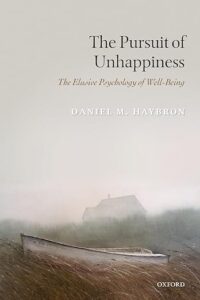
If we can just rest in that reality, and how stressful is it for me? I’m in the middle of finishing a manuscript for a book called The Pursuit of Unhappiness. It’s based on the idea that life can be stressful when we feel like everything we do is an attempt to force the universe to align with our desires. Because we feel like we haven’t actually fulfilled them yet. We’re bending, we’re moving, and we’re shaping. That’s why, for the most part, most people going through life feel stress and anxiety and pain, and we get triggered and all these things.
That’s not necessarily a bad thing. It’s just the universe bringing to light, “Hey, there are areas in your life that you’re still attached to and you haven’t let go and you’re not free. If you’ll just let go of those things, you can be free.”, I think if we put just as much attention into that as we do the pursuits of the things we think that’ll make us happy, we can all live a little bit more freely and happily and joyfully.
What did you do with your agency? You have a marketing agency that specializes in Facebook, Meta, advertising, and one of the top experts in that area. What happens with that?
It’s a great question because I’m in the thick of it. We have two potential outcomes to consider. One is that this is a lesson I’ve learned the hard way, we built that business so it couldn’t necessarily be sellable. It wasn’t an asset that could be sold because it was so deeply tied to Nick’s personality and character. We are in the midst of deciding whether or not we hand that off to a second in command and just let them continue to run it in whatever way possible, or to literally close the doors and end that chapter altogether, with like no residue, the whole burning of the Spanish ships behind us.
That is a decision that is currently unfolding as we have this conversation. I don’t know the exact answer just yet. All I know is that my involvement, as well as my wife’s, who is also very much involved, has come to an end. In the next chapter, we will explore the actual agency and its contribution to that specific piece of work.
Good luck with that. I’m sure it’s gonna unfold the way it’s meant to. You were in a movie. Why don’t you tell us about how that came about and how that changed your life and your voice?
Dropped the list altogether and went straight to the source, having that experience, regardless of whether the universe lined up with our will and our little checklist of happiness.
We’re making a movie. Again, in the spirit of unconditional openness, there was a time when we were still in the thick of our marketing business, and somebody reached out to us and said, “Nick, we’d love you to help us with the marketing of our business.” I said, “Well, talk to my sales team. Like, I don’t really get involved in those conversations.” They spoke with the sales team. They had these conversations. The investment to work with us on that level was approximately $50,000. The company’s founder said, “I’m in. But if I’m going to cut a $50,000 check, I’d love just for seven minutes to talk to the guy.” I’m like, “That’s fair. You could do that.” We arranged a call for me to speak with the founder of this company. The seven minutes turned into 21 and turned into 40.
He is actually a very interesting character. He studied brain science in university and then started teaching it, only to realize that nobody wanted to learn academic brain science. It was just like robotic, ‘here’s what the thing says about the brain.’ He said, “Well, what is a better way for someone to have an experience?” With these ideas. You realize that storytelling was the way to do it. Suppose there’s a part of the brain that responds much better to storytelling than it does to academia. What if I just pursued this path of teaching through storytelling, and then one thing led to another, and he picked up a video camera? He was then asked to support his friend at a wedding to shoot the wedding. At the last minute, his friend bailed and said, “I can’t make it. You’re on your own. You’ve got to shoot the wedding.”
He’s like, “I don’t know what I’m doing here, but I do understand storytelling. What if I just don’t know anything about the camera? I don’t know anything about cinematography, but what if I just shot this as though it were a story instead of just capturing moments at a wedding?” Long story short, he ultimately dominated the wedding industry. The NFL reached out to him because they saw one of the clips from one of his edits at a wedding and said, “Can you shoot something for the NFL?”
He ended up shooting for the NFL. Then the Four Seasons reached out and said, “Can you teach us about storytelling?” He’s the only person on the planet right now who is the, I guess, the official story, teaching storytelling guy, where the Four Seasons, many of the resorts invite him out once a year to come out and teach their team and do marketing and create assets for them and that sort of thing.
Everything can bring us joy because it’s not actually the thing itself that brings us joy. It’s the joy that’s already there.
He built a film business. There were two sides of the company. One is teaching other filmmakers how to tell stories. On the other side of the business, we were shooting documentaries for high-level individuals. When we connected, I thought his only business was shooting documentaries. I said, “Hey, do you shoot documentaries and tell me how this works? Do you focus on influencers and people in the space?” He goes, “I don’t, but that’s a great idea.” We started talking, and he said, “Okay, let’s engage in business.” We started talking about marketing. But in true storytelling fashion, he goes, “I want you to meet with our story finder.” And I said, “I don’t know what the heck is a story finder.” He said, “It’s a woman who just asked you questions, because if we’re going to work together, we want to know as much about you as you know about us, so that we can really build this marketing piece together. I have this story, story-finding call with the story finder.” She goes back to Patrick and says, “You really have to talk to this guy. I know we hired him for marketing, but he seems really passionate about this, this spirituality slash personal development slash neuroscience stuff or whatever.”
We get back on another call, and we end up discussing the topic for hours. He goes, “This seems like A is really important to you and B, a message that the world needs to hear from your perspective. Have you ever thought about doing a documentary around it?” I said, “No, and it sounds expensive, and it sounds like it’ll take up too much of my time, so I’m not interested.” But in the spirit of unconditional openness, one thing led to another. We embarked on this journey of shooting this documentary.
What was supposed to be a film about personal transformation on one hand, ended up being the greatest transformative journey of my own life. Because as part of this, we flew to Nepal and we lived in a monastery for a week with the monks and had debates with llamas. We’re going to the Mori tribe to live with an indigenous group and experience what it’s like to be in harmony with your surroundings and nature.
The more you try to bend the universe to your will, the more it breaks you. That’s where stress lives. Share on XI’m flying to Imperial College next month or whenever this is being released to have conversations with the leading universities and clinicians on the study of consciousness and the study of psychedelics, and all these things are now being studied in human trials. It’s taken us on this crazy journey, which, inevitably, has forced us to make the most beautiful decision: to retire from marketing and get into this type of work. The documentary was a small side project, but it ended up being the most transformative experience of my life to date. It’s part of the reason I’m standing before you now, discussing this topic and making it my life’s purpose, rather than pursuing digital advertising and marketing.
Of course, it’s another divine setup. You collaborated with the creator on this before you even incarnated, and it became your mission, one that you would stumble into at some point.
Well, I was meeting a friend of mine in Austin, and we were texting back and forth. I was going to meet him on a Saturday, Jesse Elder. This was on a Thursday. I said, “Hey, brother, I’m really looking forward to seeing you on Saturday.” He responds by saying, “I remember us having a great meeting on Saturday.” At first, I was like, “What do you mean you remember us having a great meeting? We didn’t have the meeting yet.” Then it’s like, “I get it.” Just like what you’re saying, Stephan, maybe all this has already kind of happened. We’re just kind of stepping into the invitation of it in our improv class, as it all unfolds in this very strange thing that we call life.
What’s the movie called?
The current working title is Unbecoming. The reason for this is that, at its core, it challenges the notion that life is primarily about becoming more, adding to who we are, enhancing our character, expanding our avatar, achieving milestones, and accumulating achievements. All the things life told us we need to do in order to feel better, fulfilled and happy and peaceful. What if the answer is not that, but it’s unbecoming all the things that we added on to us that provided a veil on top of the true essence of who we are, the witness consciousness?
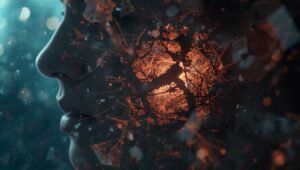
The example or the metaphor I like is Michelangelo‘s David. When someone asks, “How did you know how to sculpt David out of that rock?” He goes, “That was easy. I just chipped away everything that wasn’t David.” It’s a beautiful metaphor for how we perceive transformation in life and the human experience. It’s less about adding and more about subtracting.
I noticed you never mentioned the name of the molecule. You just said a “Molecule,” are you doing that purposefully, because maybe it might get, I don’t know, Shadow band on social media or on YouTube?
No, actually, the reason I’ll tell you straight up is that it’s 5-MeO DMT, not to be mistaken with NNDMT, and I can talk very much in depth about the differences between the two. Its nickname is the God Molecule, whereas NNDMT’s nickname is a Spirit Molecule, and I think those names are very appropriate. The reason I don’t usually bring it up unless asked, which I love discussing, is that we can delve as deeply as you’d like, because I wouldn’t want anyone to feel like it’s the only path. I get really passionate when I talk about it because it was one of the tools in my path to discovery. For the vast majority of the population, it is a beautiful accelerator that can take someone to a point of what I would call modern awakening, but it’s not mandatory.
I would just hate it when we let’s do some real talk. When I look out into the world of psychedelics right now, all I see is another form of materialism with a halo on it. In other words, materialism is the pursuit of material things to feel a certain way. What happens is when people get enlightened, if you want to call it that, from a psychedelic experience, they’re like, “I’m not interested in material stuff anymore.” But they’re on this unconditional, no-end path, and every weekend they’re going to another psychedelic experience looking for some version of awakening. One thing leads to another, and they don’t find it, so they look for the next thing, and then the next thing.
What was supposed to be a film about personal transformation on one hand, ended up being the greatest transformative journey of my own life.
The last thing I would want to do is be a proponent of spiritual masturbation, if you will, where people are just like, “I’m looking outwardly instead of inwardly for truth.” However, I do have a particular bias towards 5-MeO. I can talk about why, but 5-MeO DMT, or AKA the God molecule, is the one that had the most transformative accelerator; it was a catalyst for my wife and me. It is a molecule that we personally work with when we are facilitating experiences for people.
Is it legal or illegal in the US and Canada?
Depending on. It’s state-specific. Generally, in the US at large, it is considered a Schedule I substance. For those unfamiliar with the term, it typically refers to activities that are prohibited or restricted by law. In Canada, and particularly in the province where I live, BC, it is not scheduled. It doesn’t mean it’s perfectly legal. But you are allowed to possess and own and have and self-administer it here.
Okay. There are clinics and there are shamans and stuff that are in North America that provide an experience with that molecule.
Clinics, no, because it is not considered for removal from the list of substances being considered for scheduling changes. Now, the three main substances right now that are in consideration, although the FDA shut that down earlier this year and set the industry back a bunch of years, are MDMA, ketamine, and psilocybin, used heavily for PTSD and things in clinical therapy.
A lot is going on there, but you could go to many places in the US, for example, and find a ketamine clinic that the government sanctions, prescribed by a doctor, fulfilled by a compounding pharmacy, and it is completely above board and under the conditions, you meet all the requirements there. Psilocybin and MDMA are a little bit different. Even though federally they’re considered scheduled ones, there are certain states that are allowing for it in certain therapeutic senses, which is a very weird thing because federally you’re not allowed to, but statewide you are.
There are what are known as shadow clinics of people who are, let’s call it gray, you can’t legally be upfront about what you’re doing there. But again, it’s because it’s being considered on some levels in specific states, you can still have those types of things. The interesting thing about 5MeO in particular is that it is a fairly new molecule. Meaning there is no ancient, historical, indigenous cultural use of it. Now, there’s a little bit. Certain tribes used it in snuffs when mixing it with other things, and that’s the plant version of it. But 5MEO has really come on the scene in the 80s. It’s mostly used in neo-shamanistic practices, meaning no cultural or heavy indigenous use is the neo-shaman, the modern-day shaman who says this is how we’re going to use it.
All forms of personal suffering are foundational to the misbelief that we are separated, whether we’re separated from God, separated from each other, or separated from everything around us.
It is a very interesting molecule in this sense, as it has no cultural ties per se, no clinical ties, and no long history of usage, particularly in the organic, non-synthetic version. It is a very interesting one that again, people have to consider with a lot of care, for example. Secondly, it is known in many circles as the most potent molecule or psychedelic on the planet. It is definitely not one to be taken lightly.
Does your brain make that molecule?
It is endogenous to the brain in trace amounts. It is in your brain already, which is why a 5-MAO experience vaporized is an 8 to 20-minute experience. There are various reasons for that. But one of the reasons is that it is endogenous to the brain, and your body knows how to metabolize it naturally. It doesn’t necessarily see it as a foreign substance, and it has the ability to metabolize it. It is currently in trace elements in your brain.
You can make more of it by doing, for instance, breathwork exercises, which can help you get into a deep state, a kind of trance.
Meditative type states. There are ways, and many things are being taught out there, whether it be breathwork or certain forms of yogic meditations that can draw on that, or even dispense with some pineal gland-type exercises that try to activate it even more. There are ways to increase it from an additional standpoint, such as getting small peaks of it. There’s nothing out there that can cause an exponential release of it in the brain except for what is currently being studied. When someone is born and when someone dies, there are arguments around animal testing because they can’t test it on humans right now.
When you die, 5-MeO is and various forms of DNT are released and flood the brain in the death experience, which is fascinating because many people who have the experience allude to a form of ego death or a self-death as part of the process. There are interesting correlations, but again, they have never been tested in human trials to date.
Have you watched many of these near-death experience videos? People are recounting what they experienced, and it’s mind-blowing.
It’s super fascinating. It’s a peak on the question of what almost all of humanity has been asking. It’s like, ‘What happens when we die? Is death a thing?’ Depending on what you believe there. There’s an amazing threshold that can happen. What I’ll say about 5-MeO and why it’s an interesting molecule that sets itself apart from the other ones is that most other psychedelic molecules, psilocybin, MDMA, even LSD, and NDMT, when they affect your brain, they flood the brain with content. That could mean bringing up subconscious ideas and things stored in the mind. It can, in some cases, be that many people believe that NDMT opens you up because your brain is entropic. The entropy of your brain gets opened up a little bit. You start seeing other realms or dimensions or whatever terminology you want to give to them. But it is a content flutter of the mind.
All of our outcomes, internal experiences, and how we view life —everything in its purest form —should be awareness.
5-MeO, instead of bringing content, dissolves all content. All material content, that which takes form, is dissolved. All spiritual content, everything that doesn’t take form. Multi-universe ideas, spiritual realms, dimensions, all of that also dissolve. What you’re left with in the middle of the experience is nothing but pure awareness. It’s in that awareness that all the main, many of the ancient traditions have been speaking of the God within, the witness consciousness, the non-dual understanding of where all content disappears, and all that is left is just awareness.
That is the experience that I had, which set me on the path of trying to explain what that meant and what that was. It’s special because I believe that all forms of personal suffering are foundational to the misbelief that we are separated. Whether we’re separated from God, separated from each other, separated from everything around us, it creates this sense of, ‘I’m separated and therefore I lack, and because I lack, I therefore need to find something to fill that lack.’ We go on these crazy pursuits that we talked about earlier.
Suppose separation is the cause of much suffering. The antidote is understanding oneness, union, or whatever term we prefer to use, such as witness, consciousness, or any other term we choose. 5-MeO is the only molecule on the planet that can allow someone to have that experience nearly instantly. Not the only way to do it. I don’t suggest everybody go out and start looking for an experience if you’re called to it, great. But if you’re not, don’t. But I think that’s why we put some extra bias emphasis on that. Because unlike some of the other psychedelics and molecules on the planet, this truly does create an opportunity for all content of experience to dissolve and all that is left at the core of it is you in pure awareness. Once you have that experience, there are some life changes for you.
One of the Dispenza meditations, or maybe as many of them, is talking about you becoming nobody and no time and no space with no thing. And is that what you’re describing with that experience?
That’s exactly what it is, in a very accelerated and experiential way. A great example of this is that we facilitate these experiences weekly for people. Just this past week, we had a guy who had just come from a Dispenza experience. They knew the idea, and I said, “Hey, I think Dispenza calls it touching the void or calls it the void.” He was using this terminology, and I said, “Well, have you had that experience at the Dispenza event?” He said, “Yeah, I did.” I said, “Ok, you’re going to be very familiar with this. This is just going to take you there very quickly and to a depth that you haven’t yet experienced. Are you ok with that?” He said, “Yes.” He had the experience. That was ultimately what he said at the end of it.
Sometimes life happens, and as life happens, we get these imprints, and these imprints are just unresolved things that happened from our past.
The Dispenza meditation lasted six hours, and during those six hours, he experienced this nothingness, this void. With experience, he got there in about 10 seconds and to the depth times 100, and then came back. Now, it was like that was just the same thing, but it was faster and deeper. To your point, it is very much against. I’ve never had a Dispenza experience; I can’t speak to it directly. I can just refer to someone who has had that experience.
But in his words, it was very much the same thing, but faster and deeper. That’s why we call it an accelerant. It shouldn’t be seen as a crutch or a dependent thing. But for many, and I’m not going to use this as an excuse for many, meditating for six hours is not a feasible thing for them daily. Having an experience that can show you how to get there faster is helpful for some people. It’s all the same path, and we’re all going the same way. It’s just the tools or the paths you choose to get there that are obviously very personal.
You’re putting on a 33-day challenge. It’s all virtual, and you can also share any other resources you have.
I thank you, Stephan. I really appreciate that. Through this work, we’ve experienced that it is my current understanding that our experience of life is often predicated on whether or not we were able to deal with what I call the imprints that were left on a neural operating system or a nervous system. Our nervous system is the interface by which pure awareness has an experience with the material world. It’s kind of the interface in between.
All of our outcomes and all of our internal experiences and how we view life and all of that in its purest form should be awareness, having an experience from the external world that comes in, has the experience and then relives it, and it’s pure. It’s joy, and it’s this wonderful improv class full of love, joy, peace and all those beautiful things. However, sometimes life happens, and as life happens, we get these imprints, and these imprints are just unresolved things that happened from our past, which, as I define it, is that they break the code a little bit in our neural operating system. There’s just a line of code that makes things fuzzy. Over time, some of these codes stack on top of each other, and all of a sudden, they manifest as anxiety or stress or whatever these things are.
I spent the last five years of my life figuring out ‘what that means spiritually and what that means from a neural perspective.’ We’ve created a 30-day experience that we call Rewired. That’s really just some basic daily practice. See it like 75 hard for your soul. Basic daily practices that you can do for 30 days. In doing so, they start to dissolve the power and the grip of the imprints, so you can start having a little bit more of that free-flow experience. For that, unbecomingcourse.com. So, unbecomingcourse.com/rewired is where you can go. Depending on when you hear about the URL and when you arrive, it’ll either be a waitlist sign-up, as we’re about to launch in a few weeks. Or, if it’s already live, you can join at any time and see the details on how to enroll. But it is completely free.
It is everything I know and have learned from all the lamas at the monastery in Nepal, as well as the neuroscientists studying consciousness at Imperial College, combined into one 30-day daily practice that allows you to do so. That’s what we’re hoping that everyone gets a little touch and experience of. Again, unbecomingcourse.com/rewired is the URL. Thank you, Stephan, for letting me share that.
The main site on becoming course.com is where they would go for more information about the upcoming documentary. When do you think?
Yes, we are hoping for Q2 of 2026, which is a few months away. Unbecomingcourse.com will show you some of the educational arm of what we have there, or unbecoming.themovie will show you everything. You can watch the trailer, you can see what’s going on, and get all the updates on everything that’s happening there. It’s exciting times. Depending on when someone’s watching this or listening to this, the movie could already be out, and I hope you enjoyed it. It fulfills everything we’ve been trying to achieve over the last couple of years here.
Awesome. Well, congrats and good luck with the movie launch and the book that you’re working on and all the amazing stuff that you’re creating and putting out in the world. Kudos to you.
Stephan, I express my deepest gratitude to you on many levels for following your intuition and allowing me to share some of the things going on in my life. As I mentioned, this is the first podcast where I’ve been able to discuss this topic. For you being willing to A, be in this world now. You had a marketing thing going on, and you’re in this world, too. I would like to take a moment to express my sincere gratitude for the opportunity to discuss this with you.
Thank you. Thank you, listener. Thank you for being part of this journey with us and for being a light in the world. We’ll catch you in the next episode. I’m your host, Stephan Spencer, signing off.
Important Links
Connect with Nic Kusmich
Book
Films
People
Previous Marketing Speak Episodes
YouTube Videos


